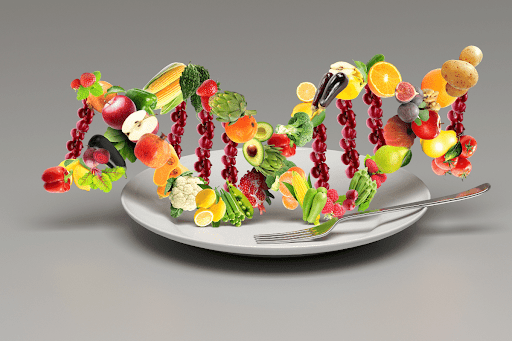Nutrigenomics: Your Key To Fitness & Well Being
Nutrigenomics is the study of; the relationship between genomics, nutrition, and health. Nutrigenomics provides the understanding of the body’s response to micro and macronutrients as well as the relationship between genes and nutrients.
Why Is Nutrigenomics Popular Nowadays?
DNA tells a lot about who you are. It’s like a blueprint of your body. DNA testing can let you know how your nutrition needs to be adjusted for the perfect weight.
Nutrigenomic tests help you discover your unique nutrigenetic profile. But with an in-depth selection of personalized insights. It helps you to discover how to build your perfect meal; with recommended diet type and your carbohydrate & fat response take control of your long-term health with personalized nutrient recommendations.
Some genetic factors can also disrupt your body’s ability to absorb the vitamin. For example, certain gene variations can affect how well your body can use vitamin B12.
How does Nutrigenomic benefit your health?
Nutrigenomic helps us in:
(1) A better understanding of vitamins and mineral deficiencies.
(2) Prevention of certain diet-associated such intolerances.
(3) Avoiding unhealthy food that is regularly used but might have a bad effect on a particular individual’s health.
(4) Prevention of diseases and an increase in life expectancy.
(5) Nutrigenomics also provides a sneak peek at the reasons why you are not able to lose weight even after dieting and exercising regularly.
DNA Test to Identify Your Diet and Nutritional Needs
DNA-based diet and nutrition tests can provide you with information about your dietary needs. A diet that is right for you takes into account your genetic tendencies. A correct diet will help you achieve your health goals more efficiently and quickly.
DNA testing can help you provide information on the below factors:
- Vitamin and Mineral deficiencies- Calcium, Iron, Vitamin A, Vitamin B, and more.

Genetic insights to help you understand which nutrients, vitamins & minerals; are not optimally processed by your body and how you could fix these issues with the help of personalized nutrition recommended by your doctor or dietician.
Genetics plays a vital role in how your body absorbs vitamins into a usable form. For example- gene variation in the BCMO1 gene impacts the absorption of Vitamin A by changing its protein structure, resulting in disruption of fat metabolism and causing weight gain.
Similarly, mineral deficiencies are also regulated by genetic variations. That results in slow body metabolism such as fat breakdown and insulin resistance. For example, insufficient magnesium in the body has been linked to insulin resistance, which can cause weight gain and type 2 diabetes.
- Food Intolerances

Some people are genetically predisposed to food allergies or sensitivity suggested by several studies.
For example, if one family member has lactose intolerance, other individuals in the family may have that same lactose sensitivity. It is important to note that family members with the same food sensitivity may share a genetic predisposition that contributes to the development of food sensitivities. By taking a DNA test, you can know your body’s sensitivity to foods and how your genetic predisposition impacts your ability to digest certain foods like Carbohydrates, Lactose, Caffeine, and Gluten.
- Body Mass Index (BMI)

People with overweight and obesity appear more likely to have low micronutrient (Vitamin & Minerals) levels compared with people with weights falling within the “normal” body mass index (BMI) range. It has caused some to suggest that low Vitamin & Mineral levels cause weight gain.
If you are not getting all your vitamins and minerals, a slow metabolism will also contribute to progressive unwanted weight gain or high body mass index (BMI).
Genetic variation in vitamins and minerals also affects fat metabolism. Genetic testing can tell you if you’re missing a vital nutrient to help you lose weight so that you can maintain your ideal body weight.
- Taste Perception

People have different tastes and preferences when it comes to food. Taste is a pretty significant factor in what we choose to eat. Tastes are also known as “nutritional gatekeepers”. Evolutionarily, we developed taste receptors genes to detect sweet, savoury, and bitter flavors. Variations in these genes can cause people to perceive these tastes differently.
For example, it is been observed that obese individuals had more inclination toward fatty foods and had strong fat taste perception.
DNA tests give you a window into your taste buds, what they like, what they don’t, and why. They also help you learn about the nutritional content of food as well as any weight gain that may be due to an unhealthy preference.
How do DNA-based Diet and Genetic Testing Work?
A DNA test can be performed by taking a saliva sample. Saliva is an easy, non-invasive means of collecting a sample, and it contains enough DNA to generate a good genetic report. When you get your genetic reports, consult with a certified nutritionist, you can plan your diet accordingly and start seeing results.
A nutritional DNA test and consultation with a doctor or dietician can help you manage your fitness goals. These plans are created to prevent food sensitivities, keep your body weight in check, maintain a healthy weight, and prevent various food-related illnesses.
Genehabit’s Nutrifit Test for DNA-based Diet and Personalized Nutrition gives detailed and personalized genetic reports about your taste perception, food intolerance, micronutrient deficiencies, etc. Click here to read more about NutriFit Test or connect to our expert.
Have a look at our products with consent links:
GeneFit provides a 360 degree personalized genetic insight about the risk associated with your lifestyle and fitness – extreme weight gain or loss, nutritional deficiencies, food sensitivities, optimal physical activities, sleep, and stress. Click here to read more about the GeneFit test or connect with our experts
NutriFit DNA test identifies your micronutrient demands based on your genetic reports. NutriFit DNA test report provides you with an insight into your food sensitivities, food allergies, taste perception, and nutritional intake required for you. A personalized DNA-based diet is given considering your report to maximize your health benefits. Click here to read more about the NutriFit test or connect with our experts


















Leave a Reply
Want to join the discussion?Feel free to contribute!